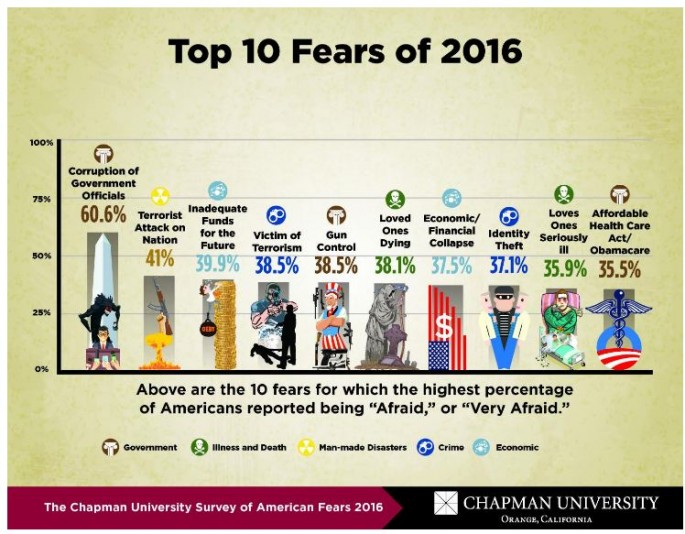The top fear among Americans isn't terrorism or being a victim of terror but remains corruption of government officials, a perception that can be linked to the broad mistrust of government readily apparent in the contentious U.S. presidential elections.
The Third Annual Survey of American Fears (2016) from Chapman University also found the U.S. is "a strongly conspiratorial society" due to its affinity for conspiracy theories. It also found one in three believes in the paranormal.
The survey, however, revealed Americans are an incredibly caring people, with two of the Top 10 fears related to their fears about people they love dying or becoming ill.
Terror and Islamophobia also figured in American fears. In the top 10 fears, "terrorist attack" ranks second with 41 percent of Americans being afraid of a terror attack. More than 60 percent believe the U.S. is likely to experience a large scale terrorist event (such as 9/11) in the near future.
When it comes to feelings about and treatment of Muslims, nearly half of Americans reported they won't be comfortable with a mosque being built in their neighborhood. One-third reported Muslims are more likely to engage in terrorism, as well as agree the U.S. should halt all immigration from Muslim nations.
Whites revealed significantly higher levels of Islamophobia than non-whites. The survey also showed a strong relationship between political party affiliation and anti-Muslim views. Republicans expressed the highest levels and Democrats the lowest, with independents in the middle.
Chapman University is a private, non-profit university located in Orange, California affiliated with the Christian Church (Disciples of Christ). Founded in 1968, this church is a mainline Protestant Christian denomination in the United States in the Reformed tradition. It has some 500,000 members in the USA.
The survey asked respondents about 65 fears across a broad range of categories including fears about the government, crime, the environment, the future, technology, health, natural disasters, as well as fears of public speaking, spiders, heights, ghosts and many other personal anxieties.
In addition to the set of fears examined in previous surveys, the survey team took a closer look at two fear related phenomena: Americans' beliefs in conspiracy theories and fear of Muslims, also called "Islamophobia."
The survey included more than 1,500 adult participants from across the nation and all walks of life. The 2016 survey data is organized into five basic categories: personal fears, conspiracy theories, terrorism, natural disasters, paranormal fears, and fear of Muslims.
The 2016 survey shows that the top 10 things Americans fear the most are:
1) Corruption of government officials (same top fear as 2015)
2) Terrorist attacks
3) Not having enough money for the future
4) Being a victim of terror
5) Government restrictions on firearms and ammunition (new)
6) People I love dying
7) Economic or financial collapse
8) Identity theft
9) People I love becoming seriously ill
10) The Affordable Health Care Act/"Obamacare"
"The 2016 survey data shows us the top fears have shifted from last year's, which were heavily based in economic and 'big brother' type issues to include more health and financial fears this year," said Christopher Bader, Ph.D., professor of sociology at Chapman University, who led the team effort.
"People often fear what they cannot control and we find continued evidence of that in our top fears."
An anti-Muslim bias among many Americans should be a source of concern.
"For a nation that touts its commitment to religious liberty, the prevalence of these beliefs should be disturbing," said Ed Day, Ph.D., chair of the department of sociology at Chapman University and one of the three researchers on this survey.
In examining beliefs about Muslims from different regions of the country there was a striking finding--the difference between people living in metropolitan areas and nonmetropolitan Americans.
Urban residents are much less likely to distrust Muslims or support institutionalized discrimination. When it comes to gender, the survey showed that men are more likely than women to hold anti-Muslim opinions.
"Results from the Chapman University Survey of American Fears 2016 show significant portions of the U.S. population distrust Muslims and believe the nation is justified in singling out one religious tradition for increased law enforcement scrutiny," said Dr. Day.
"Those with Islamophobic views are more likely to be rural, male, white, older, and lacking a college education. However, the survey data do not allow us to dig deeply into the sources of anti-Muslim prejudice. Regardless of the sources, the prevalence of anti-Muslim sentiment is a concern."



























